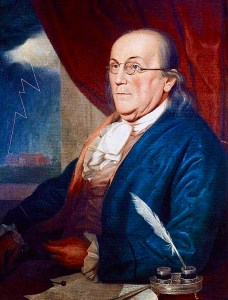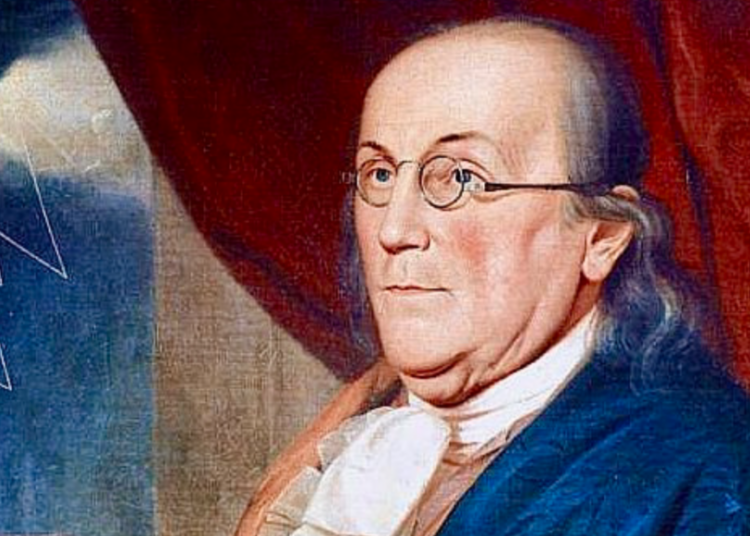Even today, many Americans take an intentionally anti-intellectual stance, agreeing with the rationalists that faith and reason are incompatible. Blind Benjamin Franklin is father to them all.
 Apart from his rejection of wigs and the incident with the kite, the key and the lightning bolt, I’m afraid I have never been impressed or attracted to Benjamin Franklin. There was too much of the old-world rationalist and deist in the new-world inventor and sage. Despite his accomplishments, there was something as dull about the man as his po-faced portrait staring from the hundred-dollar bill. Franklin was utilitarian and unitarian, practical and puritanical, materialistic, mechanical, efficient, economical, sensible, and sincere… and dull.
Apart from his rejection of wigs and the incident with the kite, the key and the lightning bolt, I’m afraid I have never been impressed or attracted to Benjamin Franklin. There was too much of the old-world rationalist and deist in the new-world inventor and sage. Despite his accomplishments, there was something as dull about the man as his po-faced portrait staring from the hundred-dollar bill. Franklin was utilitarian and unitarian, practical and puritanical, materialistic, mechanical, efficient, economical, sensible, and sincere… and dull.
Like most Freemasons, Franklin had a spiritual blind spot. There was nothing wild and mystical in his life. Passion and romance in religion were alien to him. His creed was one of common sense, mild-mannered good works and human virtue. As such it was not only blind. It was bland.
I came across a quotation of his the other day which sums it up. He wrote, “The way to see by faith is to shut the eye of reason.” It is the sort of sophomoric bromide one expects from rationalist, and it doesn’t stand up to even the mildest of objections.
It is understandable, however. Ever since the nominalists suggested that material things had no connection with the unseen world and were no more than what you call them, a divide had been growing between the physical and the metaphysical realms. The Protestant Revolution confirmed the break, and the Enlightenment hammered it home with the French and American Revolutions.
If there was a divide between the spiritual and the physical realm, then preachers could have nothing to say about science, and scientists had no concern with religion. Science and reason dealt with this world and religion with the world to come, and that was that.
Consequently, the Protestant religion became either an abstract debate about theology or a subjective, emotional experience. In other words, you could be a bookish Bible nerd or a hellfire, “come to Jesus!” weepin’-and-wailin’ preacher. Neither had much to do with the material realm, and neither had much use for science and reason. Thus Benjamin Franklin’s conclusion that to “see by faith is to shut the eye of reason.”
Fideists and fundamentalists distrust the man of reason as much as he distrusts the man of religion. Therefore, even today many Protestants take an intentionally anti-intellectual stance, agreeing with the rationalists that faith and reason are incompatible. Blind Benjamin Franklin is father to them all.
Standing in contrast to this impasse is the Catholic religion which has always contended that faith is reasonable and reason requires faith, or as Pope St. John Paul II put it, “Faith and reason are like two wings on which the human spirit rises to the contemplation of truth.”
The fact of the matter is that true religious enquiry is actually very similar to rational, scientific enquiry. The method of scientific enquiry involves more than simply conducting experiments. Making scientific discoveries involves a process which involves not only proof gathered from experimentation, but also a reliance on data that is only probable, an acceptance of tradition mixed with informed theorizing, creative guesswork and sparks of enlightened intuition.
True religious discovery relies on a similar process. In both science and religion the first step is to observe the real world and draw conclusions from one’s observations in order to construct a meaningful analysis of reality.
This process is assisted in the individual enquirer (be he scientific or religious) by what might be called “tradition.” In other words, we use the observations and conclusions of those who have lived before us to inform our analysis and to enable us to build up a credible and cohesive analysis of the world we observe. Neither the religious or the scientific explorer starts from scratch. Others have been here before us. They have drawn maps, published memoirs, left records and given instructions for the journey.
Scientists do their work on the basis of an ever growing body of scientific knowledge which they take as proven–even if much of that “scientific knowledge” has only been established through theorizing, intuition, guesswork and probabilities. So it is with the religious enquirer. He relies on the findings and experiences of those who have explored the realm of religion for thousands of years in many different cultures and human experiences. Just as scientists specialize in many different disciplines, so the phenomenon of religion has been explored not just by monks and nuns, but by psychologists, sociologists, theologians, anthropologists, artists, poets, mystics, madmen and children.
From that foundation of personal observation and reliance on tradition the scientific enquirer proposes a theory to explore and discover further. So does the religious enquirer. Both devise a theory to meet the facts and answer a question that has arisen. The enquirer then tests the theory with experimentation–gathering data and experiences and processing them through intuition, reasoning and further reliance on tradition. Should the experiment fail, he uses the error to refine the theory and continue his exploration until he finds a satisfactory answer.
This is precisely what the informed and intellectually engaged religious enquirer does. He has certain experiences which are analyzed and filtered through tradition and he goes on to explore further, analyze experience, test reality, reject what is false and affirm what is true, and as he continues his exploration and experimentation he uses a combination of personal experience, tradition, reason and intuition to analyze and construct a working hypothesis.
Then, for both the scientist and the religious explorer there comes a step which we can call “faith.” The homework is done, the data is collected. The experience is analyzed, the tradition is accepted, the guesswork is completed, and the theory has been tested as thoroughly as possible. The scientist or the religious enquirer then changes his actions based on the new belief which he has come to accept based on this process.
Of course there are individuals–both scientific and religious–who do not go through this arduous process. They don’t think things through. They live the unexamined life. They accept the tradition blindly. They are lazy. They make emotional instead of rational judgements. Both scientific and religious enquirers therefore will come up with faulty conclusions, untenable positions, prejudiced positions and shallow choices.
Benjamin Franklin was blind to the possibility that religion could be reasonable because the Puritans who raised him would have taught him that human beings were totally depraved and can therefore learn nothing of God through their human reason.
He is justifiably one of America’s founding fathers because the majority of modern Americans today believe the same and are therefore, sadly, similarly blind.
This essay was first published here in May 2015.
The Imaginative Conservative applies the principle of appreciation to the discussion of culture and politics—we approach dialogue with magnanimity rather than with mere civility. Will you help us remain a refreshing oasis in the increasingly contentious arena of modern discourse? Please consider donating now.
The featured image is a portrait of Benjamin Franklin (1789) by Charles Wilson Peale, and is in the public domain, courtesy of Wikimedia Commons.


